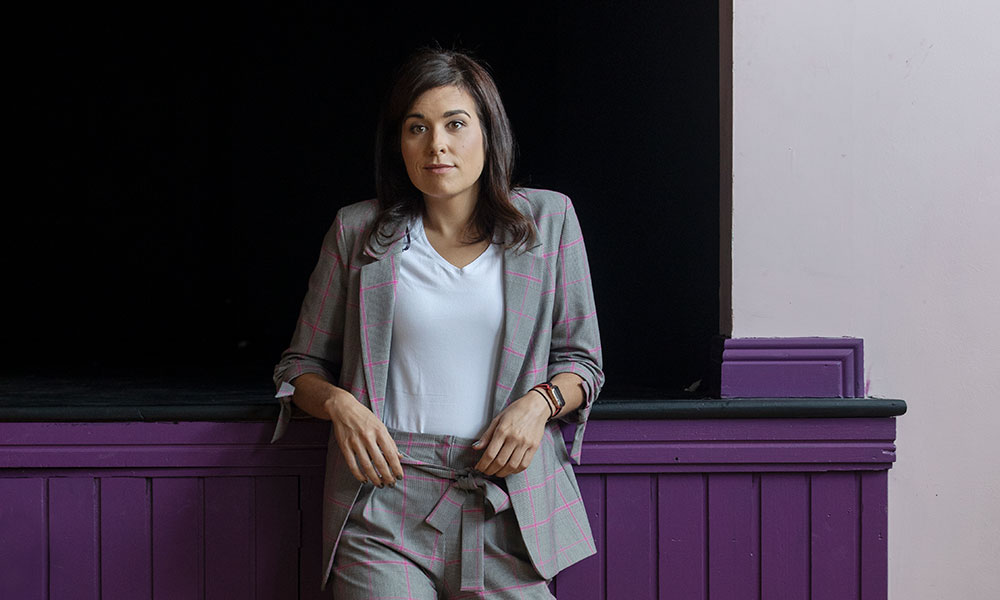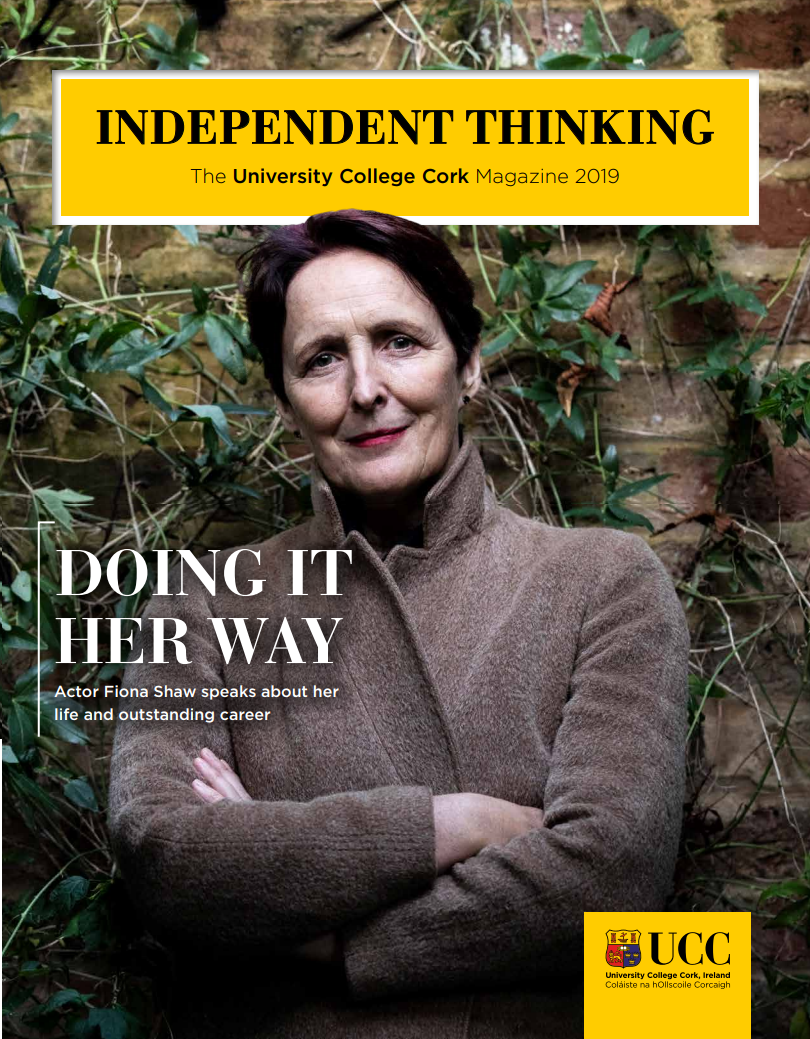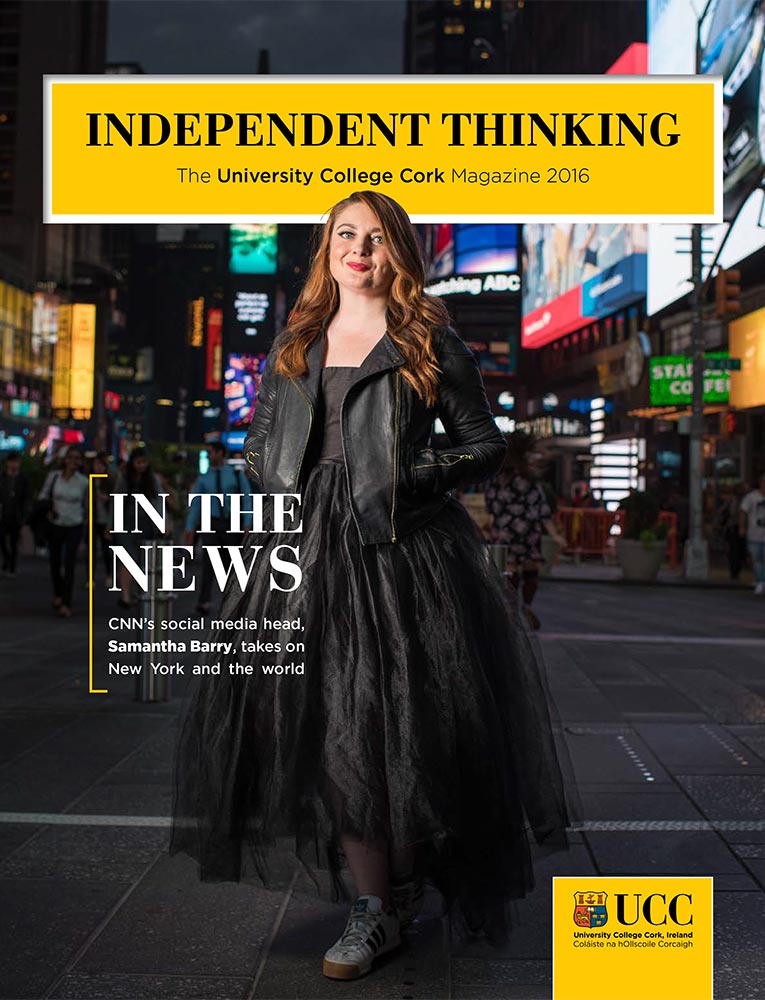Features
- Can Do, Will Do
Stefanie Preissner
- It’s not just a gut feeling
John Cryan & Ted Dinan
- Active citizen
Emily Duffy
- Leading the charge
Alan Hayes
- Gaeltacht adventures
Bliain Na Gaeilge
- Eachtraí sa Ghaeltacht
Bliain Na Gaeilge
- Don’t worry, bees happy
Fiona Edwards Murphy
- The times they are a-changin’
LGBT Staff Network
- Back to her roots
Maria Kirrane
- Shining a light
Mental Health in the Community
- Patrick’s call to nursing was no accident
Patrick Cotter
- A healthy separation, long overdue
Ivan Perry
- Woman of Steele
Susan Steele
Can Do, Will Do
Fresh from the success of her hit show Can’t Cope, Won’t Cope, writer and UCC graduate Stefanie Preissner tells Mike Ryan about her rise from uncertain drama student to one of the most prolific artists of her generation.

Writing is serious business. People are starting to realise this fact more and more. Whether it’s the latest Marvel superhero blockbuster, hit reboot of a long-dead TV show, or YA vampire fan-fiction-turned-erotic-romance novel; every new worldwide craze, across every platform and genre, is built around the written word.
With an internationally toured one-woman play, a documentary series, two seasons of her hit TV show, multiple TV pilots in development in both the UK and the US, and her second book due to come out in early 2019, few would doubt the claim that Stefanie Preissner is one of the most prolific writers of her generation. Although now firmly settled in Dublin, she reflects on Cork life while spending some rare downtime back at home with her mother.
“When you’re from Mallow, people who are from Cork tell you you’re not from Cork. You’d say ‘I’m from Cork’ and they’d say ‘you’re not from Cork, you’re from Mallow’. It’ll always be where I’m from, like,” she insists, without the slightest falter in her Cork accent.
Surprisingly, growing up she never really even considered writing as a possible career choice. “I thought that you had to be really good at English in school to be a writer,” she admits.
“I thought you had to write poems about mountains and know adjectives, and I don’t do any of that. I thought you had to know how to use the word ‘dappled’ and be impressed with ponds. I didn’t like wildlife, and I didn’t like being in nature. I liked being in the swimming pool, surrounded by chlorine, or else in front of the television with Coco Pops. It wasn’t until transition year that I started in the dramasphere, in the theatre now called the Amelian Theatre, in St Mary’s Secondary School.”
To anyone who’s going to roll their eyes at me because I say that I’m an artist, I can show them my degree.
When it came time for her to leave Mallow to explore newfound frontiers and develop her passion for theatre, she opted for UCC – just 25 minutes down the road. But even then, adapting to college life was far from smooth sailing.
“I’m a home-bird. I wanted to stay as close to home as possible, so it was always going to be UCC,” she confesses. “I loved the Drama and Theatre Studies course, and I loved the campus at UCC – it’s beautiful. But I found college quite stressful; I was a boat just adrift, you know?”
It’s said that in writing, and in life, “form rescues content”. For many first-year students, the sudden freedom of university-life is more disorientating than liberating. Much is unknown. It is a period of a young adult’s life without form. There is no instruction manual for Freshers’ Week. Luckily for Stefanie, being close to the home shores of Mallow – combined with the experience and understanding of UCC’s staff – was enough to right the ship.
“I think, had I not been in UCC, I probably would have dropped out of university. It was the best place that I could be. There were a lot of supports in place and I was close to home, and I could get involved with different things, but in another university I may have been just that much more overwhelmed.”
Once there, however, Stefanie thrived in her drama classes and began to seek out like-minded theatre-makers and mentors.
“Ger Fitzgibbon was the head of the Drama department. He was a very sensible man, and he had a briefcase – and I knew that that was... good,” she states definitively, a wry smile flashing across her face.
“It made me feel safe, because I knew that if it all went south, I was doing a course where it was being run by a man with a briefcase. Other lecturers were asking us to take our shoes and socks off, but Ger made us sit in a circle and talk about Brian Friel, which I appreciated.”

With her wicked sharp wit and talent for crafting gut-laugh-inducing similes, you’d be forgiven for thinking that this affinity for seriousness was somewhat out of character; but for Stefanie, the arts is serious business – something that she learned while earning her degree from UCC, and a feat which she feels gave her a confidence and a platform on which she could grow and develop.
“I met Ger, and I met Tom Creed, who were some of the people who formed my early career, and who allowed me to see that this wasn’t just something you did in the evenings after work,” explains Stefanie.
“You could have a career in the arts. I went in thinking that the only way I could have a career was to be a drama teacher, and I came out as an artist who had an understanding and a sort of a vindication of their efforts. I am well-equipped to argue a point, I have a lexicon and a language around this industry, and to anyone who’s going to roll their eyes at me because I say that I’m an artist, I can show them my degree.”
From UCC, she went on to graduate from Dublin’s Gaiety School of Acting and then began writing and acting in her own work. Her critically acclaimed one-woman show, Solpadeine Is My Boyfriend, was a hit at the Dublin Fringe Festival in 2012 and went on to tour internationally. It was after the success of this show that she was approached to write for television, eventually leading to two seasons of the RTE/BBC 3/Netflix smash hit Can’t Cope, Won’t Cope. Yet, despite her successes, her feet remain firmly planted in the reality of such objectively momentous achievements.
I get up early in the morning and I write, in the quiet, before anyone can interrupt me.
It’s perhaps very telling of her personality that, despite all she’s achieved in the last three years, she still shows no signs of slowing down. Last year, along with writing season two of Can’t Cope, Won’t Cope, she published her first book, Why Can’t Everything Just Stay the Same? Her follow-up, No. It’s A Full Sentence, is due out early next year. She’s also currently developing two TV pilots in the US, and a third in the UK. If her career seems bereft of any of the usual clichéd trappings of a struggling artist, it’s because she approaches her trade with the pragmatism of a government agent in a Kafka novel.
“I get up early in the morning and I write, in the quiet, before anyone can interrupt me. For my last book, my publisher said I had to give them 70,000 words in the first draft, so I divvied it up: 2,000 words a day, five days a week, for seven weeks, is 70,000 words. And that’s what I did. I just got up and wrote 2,000 words – that’s not difficult. So I did that five days a week for seven weeks, and then I had the book, and then I sent it in,” she confesses.
She is, however, quick to dismiss any fetishisation of hard work.
“People think that they’re objectively better people because they get up at four o’clock in the morning, and I think that’s bullshit. Because I think that if you’re not looking after yourself, and you’re driving yourself into the ground, there’s nothing more unattractive than that. I get eight hours’ sleep; I happen to go to bed very early because I’m pretty antisocial, I don’t really like the evenings, and I love the morning time.”
Her dedication to her craft might seem intense – bordering on obsessive, even – but for Stefanie, writing is her job; and the effort she puts into each word is warranted if, at the end of the day, somebody is going to facilitate her art by buying her book.
“Like, it’s hard work to read a book. It’s actually a bigtime commitment – you’re taking a lot of time out of your own life. And if someone’s going to give me their time to read my book, I should be showing up and giving my time to write it.”



